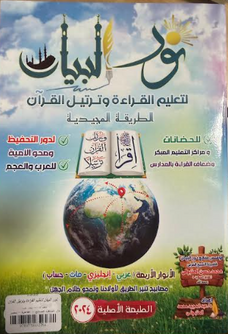How to learn Arabic fast?
Arabic is the world's fifth most widely spoken native language. With the expansion of Islam, Arabic progressed from being a local dialect to being a prominent worldwide language. Do you want to learn to read Arabic and use it in your daily conversations? Keep reading to know how.
How To Learn Arabic Language Quickly
Arabic is a difficult language to master. If you're an English speaker, you'll need to learn Arabic for longer than you would study Spanish to reach a comparable level. A more difficult language, on the other hand, is not unlearnable. Here are some practical suggestions and examples that you may simply follow in order to learn Arabic quickly:
Set a goal
What are your motivations for studying Arabic? The easiest approach to choose important terms from a sea of synonyms is to focus on a specific accomplishment as a major priority. These stages are merely the beginning of a lengthy journey. It is tough to begin learning Arabic and then test yourself to get to the point of optimal learning. But it is conceivable; nothing is impossible. Acquiring the language will take years of study; however, building up conversation skills can grow quickly if you commit yourself fully to learning Arabic.
Start with the basics
It's easy to fall into the trap of attempting to learn Arabic through understanding words rather than first studying the Arabic ABCs. Take a look at how we learned English in school and imitate it. To begin, you learn the alphabet, and then you put those letters together to form words. Then you find out how to form sentences, and ultimately you study the language's legal structure and grammar. Choosing any alternatives will just take you further away from the learning process. Contrary to popular belief, if you fight the attraction of merely in-Arabic characteristics, you will discover the Arabic dictionary. Middle Easterners may be known for idolizing excellent speaking, but they also appreciate a clear and essential writing style.
Pick a dialect
Learning Arabic is not a simple process since it takes learning a lot of new terms and requires time and experience to perfect; moreover, after you have figured out the basics, you must commit to a dialect. While learning Modern Standard Arabic (MSA), you must select a dialect and master it, but most importantly, you must stay with that dialect and not mix it with other dialects. Finding a dialect and adhering to it is one thing, but finding a dialect that is unique to a certain nation is quite another. People who visit Saudi Arabia prefer to learn the dialects that are popular there. However, it is up to you and the country you want to visit to select and improve the dialect.
Memorize new words every day
It is critical to demonstrate the Spaced Repetition System in order to remember 10-15 words every day. By extending the time in the middle of each audit, this framework enables learners to retain words, concepts, and facts for a long period. To do so, plan out what you'll acquire while keeping the overlooking curve in mind. This will then allow you to audit the terms in your relapse. It also enables you to examine phrases that you have lately retained before forgetting them. You won't hang about aimlessly checking on these things, and you won't study words after you've completely ignored them. There are several recurrence recordings, some of which are organized by point or setting. You would first be able to recall the vocabulary for fundamental conversations, then the language for meeting new people, then the vocabulary for asking directions or routes, and so on. Once you've decided the vocabulary list you want to memorize, you may learn Arabic quickly with a Spaced Repetition System.
Memorize pre-prepared phrases
Memorizing a comprehensive inventory with Arabic vocabulary is an important and necessary step toward being acquainted with the language; nevertheless, it is inadequate. To be honest, knowing isolated verses is insufficient for learning Arabic or any other language. To achieve fluency, you must incorporate these words into expressions or entire sentences that reflect how people/natives actually use them. This enables you to use it in a genuine discussion in front of others. You must memorize pre-prepared expressions using words that you are totally familiar with and comprehend. Similarly, there are sentencing tactics, just as there are relapse records. The usage of words from everyday conversations that you can recollect for learning Arabic at record speed is broad. Keeping pre-prepared fashioned expressions on hand will allow you to apply these expressions quickly and tweak them to construct more complex ones.
How To Read Arabic Fast
Development to read effectively in Arabic has a wide-ranging impact on your Arabic language learning. Reading aids in the development of Arabic competence and strengthens all other skills such as listening, speaking, and writing. Reading helps Arabic learners enhance their ability to interpret the “surface structure” of Arabic, concentrating their cognitive resources on the “deep structure” or meaning. When it comes to reading Arabic, most of us are best served by forming a habit, as with other things. Once developed, a habit removes the variable of whether or not we are ready on a daily basis. Sometimes, it is a lack of willpower more than a lack of time or energy that keeps us from doing what we know will help us learn successfully. Once developed, habits override willpower. Here are some activities in which you may engage in Arabic reading:
- Silent reading entails reading aloud to oneself in private.
- Oral reading entails reading any “learn Arabic book” aloud, whether to a language partner, instructor, or oneself.
- Intensive reading is reading shorter sections in depth, making certain that every word and structure is understood.
- Extensive reading is reading large sections for general understanding rather than pausing to comprehend every word.
Combining these techniques will be most effective for you. This requires a wide range of abilities and maintains your attention. Even though the reading tasks are quick, it is essential to complete them. This includes finishing what you start reading. Because reading in Arabic takes longer than reading in English, you may develop a tendency of starting something and then stopping halfway through the paragraph. Make every effort to get past this.
Best Books To Learn Arabic
Madina book centre has lots of Arabic series that can teach you Arabic in a very simple way. Check out Madinah Media’s virtual bookstore for Arabic learning and pick your favorite book to order. As a helpful recommendation, Arabic - Learn The Easy Way is a great book for learning Arabic for beginners. It is a one-of-a-kind, simple-to-follow tutorial designed just for beginners. The author has taken the basic method of educating through relatable instances. Grammatical structures are presented in their most basic forms to ensure that they are easily understood. Each chapter is accompanied by example activities to help you consolidate what you've just learned to improve your understanding of current written and spoken Arabic. Arabic: Learn the Easy Way will assist you in learning Arabic in the easiest way possible.
- Learn Arabic in quick and simple methods.
- Put your skills to the test with hundreds of example tasks.
- Develop your Arabic confidence, even if you are a novice.
















